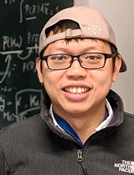2021/03/29(Mon) 10:30 -11:30 一樓演講廳 1F, Auditorium

Title
From bacteria to ants: how do individual units define the global behaviour of living systems?
Speaker
Dr. Hui-Shun Kuan (Department of Biology, Friedrich-Alexander-Universitaet Erlangen-Nuernberg, Erlangen, Germany)Abstract
Building blocks of living systems are often synonymous to out-of-equilibrium behaviours. Due to their out-of-equilibrium nature, such systems are not amenable to the traditional free energy framework and complex phenomena, such as tissue fluidization or collective motion of animal groups, naturally emerge. In this talk, I will present two such examples based on my recent work on bacterial colonies and collections of ants. Inspired by the process of colony formation by Neisseria gonorrhoea bacteria, we developed a continuum theory to study dense cellular aggregates with out-of-equilibrium attractive pili-mediated cell-cell interactions. The process of aggregate formation can be described as a phase separation phenomenon, and the merging of aggregates is rationalized as a coalescence of viscoelastic droplets where the elastic and viscous moduli can be directly linked to the turnover of the pili-mediated force without any additional phenomenological parameters. Remarkably, identical cells form aggregates with emerging inhomogeneous density and material properties, which provide the first step of understanding the morphogenesis of complex cellular aggregates, such as tissue. Unlike identical bacterial cells in the colonies, in the groups of ants, the ant excavation experiments suggested the unequal workload distribution among individuals. It remained unclear, however, why and how this is achieved. By developing computational and theoretical models accompanying advanced robophysical experiments, we could show that an unequal workload distribution can lead to optimized tunnel excavation performance. This workload distribution can be simply altered by changing the individual “laziness” of ants without any further complex manipulations. Both of the discussed examples suggest that complex biological collective behaviors could naturally emerge without sophisticated sensing and control.
Download: 
Language
演講語言 (Language): in English
Hosted by